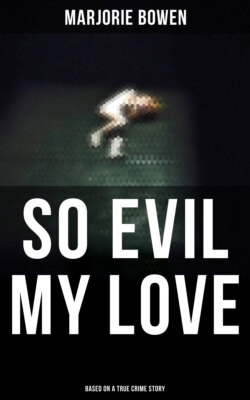Читать книгу So Evil My Love: Based on a True Crime Story - Bowen Marjorie - Страница 12
На сайте Литреса книга снята с продажи.
10
ОглавлениеTable of Contents
Mrs. Sacret arrived early at her house. Some of her neighbors coming along the narrow streets with baskets of spring greens and onions stopped to speak to her. She regarded these women as very inferior beings and never gossiped with them, but today she listened to their inquisitive comments on her departure from Minton Street and her new tenant. Apart and agreeable in manner, she told them nothing and went into her cramped parlor to wait for the painter. The place seemed intolerably lonely. Under her prim disguise, of a woman in mourning, intent on sober business, was an increasing excitement and enthusiasm, a rising recklessness, ready to gush out and overwhelm her staid conventionality. An organ-grinder was playing at the corner; as she opened the window the luscious Italian melody fell on her expectant ears with a pleasure she had not known before from any music. She took off her widow’s bonnet and veil and passed her pretty hand through her pretty hair, loosening the plain braids so that slender tendrils fell over her small ears and jet earrings. She felt, suddenly, that life would be unbearable if he did not come, if his taking of the house should prove to be a mere whim or jest.
Then, on this pang of emotion she saw him, coming around the corner, moving swiftly between the dinner hour loungers in fustian, coat and sealskin cap.
She admitted him at once, invited him into the front room and began to speak, without looking at him.
“My friends—with whom I live—advise me against you. You have stirred the curiosity of my neighbors. They tell me you have asked about several houses around here and made inquiries of me before you wrote to me.”
“I also wanted references.” She knew, without seeing him, that he smiled.
“Why? I let the house—”
He interrupted, but civilly.
“I wished to know if Mrs. Sacret was old, tedious and foolish—I could have no dealings with such. A missionary’s widow—that was very different.” His tone was subtly mocking.
“Shall we take the inventory?” she asked. “Do you really think it worth while? A beetle trap in the kitchen, a hassock here, a straw beehive chair, drugget in place of carpet—”
“I have noticed these details for myself, Mrs. Sacret.”
“This is not a street where painters—artists—men like you live. There is no studio here.”
“There is all I require.”
“We bargained yesterday, did we not? If you don’t need an inventory, and I don’t, I only have to give you these.” She took the key of the house and a receipt for a sovereign from her pocket and laid them on the stained rosewood side table where yesterday he had put down the gold piece. “You can send your rent to the address from which I wrote.”
She paused, feeling the moment wholly in his power.
“Will you allow me to sketch your portrait?” he asked.
“I was expecting that,” she returned swiftly. “One of these women warned me. They are shrewd, these common people. ‘He’s up to no good,’ she said. ‘He thinks you’ve come into money and will try to get around you. He’s been asking about the neighborhood and has heard about you.’ That is what my neighbors think themselves, that I have come into money.”
“Yes, I suppose they would,” he replied coolly and left her to continue her explanation.
“Because I was very poor and looking for a post, and suddenly left Minton Street in a carriage and pair, and am well dressed. But I am as poor as I ever was. I have nothing.”
“Does that concern me?” he asked. “And why should you in your fearless innocence trouble what the gossips say of one who is, obviously, an adventurer?”
“You admit that?”
“Yes. Are not we all adventurers, who leave rigid conventionalities behind us? Your husband was one when he went abroad as a missionary. You were another when you went to the Old Priory.”
“No doubt.” His words pleased her; she felt protected by “fearless innocence” and raised her head as if guardian angels shielded her. “I had to help a friend in trouble. God guided me.”
“Perhaps a divine cicerone brought me to Minton Street, Mrs. Sacret. May I sketch your portrait?”
Her cheeks tingled; she covered her shock at his near blasphemy by replying quickly, “Do you want to prove to me you really are a painter?”
“By no means. I doubt if I could. You are probably too ignorant to judge my capacity from my work.”
“I have some taste. This house is drab, almost squalid. Poverty and discouragement, Mr. Bellis. But I have taste.”
“I perceive it in your costume. You have contrived to make the grotesque weeds you wear becoming.”
“Yes, becoming to a missionary’s widow. These are the first fine clothes I have ever had,” she said, thinking, and the first flattery. “You’ll come? Say, the day after tomorrow, at eleven o’clock?”
“I’ll come.” She caught back the words—“you know it,” and picked up her bonnet, adjusting it without a glance at either the man or the mirror, and left the house, taking with her the carpetbag in which she meant to conceal the bottle of sherry from the local wineshop.
